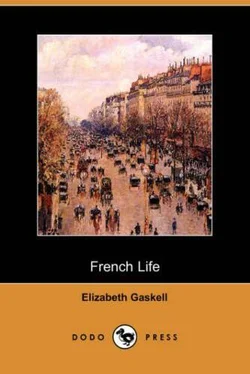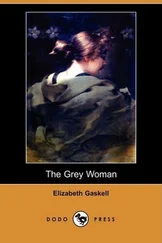Beyond Vesinet rise the fortified heights of Mont Valérien and Montmartre; so we know that the great city of Paris, with its perpetual noise and bustle, must be the cause of that thickening of the golden air just beyond the rising ground in the mid-distance. And some one found out — far away again — as far as eye could see, the spire of the Cathedral of St. Denis, and Irene fell to moralising and comparing. The palace, she said, was ever present — an every-day fact to the great old kings who had inhabited it — and fertile life and busy pomp were the golden interspace which all but concealed from them the inevitable grave at St. Denis. But sermons always make me hungry; and Irene's moralising seemed to have the same effect on herself as well as on us, or else it was the «nimble» air — for that epithet of Shakespeare's exactly fits the clear brisk air of St. Germain. They sat down to sketch, and I was sent in search of provender.
I could not find a confectioner's, nor, indeed, would it have been of much use, for French confectioners only sell sugary or creamy nothings, extremely unsatisfactory to hungry people. So I went boldly into the restaurant to the right of the station — the Café Galle, I think it was called, — and told the Dame du Comptoir my errand. I was in hopes that she would have allowed one of the garçons to accompany me with a basket of provisions, and some plates, and knives and forks; perhaps some glasses, and a bottle of wine. But it seemed that this was against the rules; and all I could do was, to have the loan of a basket for a short time. Madame split up some oval rolls of delicious bread, buttered them, and placed some slices of raw ham between the pieces; and with these, and some fresh strawberries, I returned to my merry, hungry sketchers, who were beginning to find that a seat on the hard gravel was not quite so agreeable as sitting on (comparatively) soft English turf. Yet the benches were too high for their purpose. After eating their lunch, they relapsed into silence and hard work.
It was rather dull for me; so I rambled about, struck up an acquaintanceship with one of the gardeners, and with a hackney-coachman, who tried to tempt me into engaging him for a course to Versailles by Marly-le-Roi — the Marly, the famous Marly of Louis XIV., of which the faint vestiges alone remain in the marks of the old garden plots. I was tempted. I remembered what St. Simon says; how the king, weary of noise and grandeur, found out a little narrow valley within a few miles of his magnificent and sumptuous Versailles; there was a village near this hollow for it really was nothing more — and this village was called Marly, whence the name of the palace or hermitage which the king chose to have built. He thought that he went there to lead a simple and primitive life, away from the flattery of his courtiers. But it is not so easy for a king to avoid flattery. His architect built one great pavilion, which was to represent the sun; in it dwelt Louis XIV. There were twelve smaller pavilions surrounding this large one; in them dwelt the planets, that is to say, the favourite courtiers of the time being. Every morning the king set out to visit his satellites; there were six on one side of the parterre, six on the other; and their pavilions communicated with each other by means of close avenues of lime-trees. It was etiquette for these courtiers to salute the king, who had taken the sun for his device, by placing their right hand so as to shade their eyes from his brilliancy; hence, some people say, our own military salute. Each courtier, as he was visited, followed the king in his round. At first, the king came to Many only two or three times a year, staying from Wednesday to Saturday; he only brought a comparatively moderate train; but in time he grew weary of his so-called simplicity, and the surrounding hills were scooped out to make gardens, and woods, and waterworks; and statues and courtiers thronged the place. Still, as no one could come here without express invitation from the king, to be of the parties to Marly was an object to be longed for, and asked for, and intrigued for. Indeed, it was the highest favour that could be obtained from royalty. At the last moment of awful suspense as to who was to go, the king's valet de chambre , Bontemps, went round with the invitations. There was no need of preparation, for in each pavilion there was a store of all things needed for masculine and feminine toilettes. Only two could inhabit a pavilion; and, if a married lady was asked, her husband was included in the invitation, though not in the compliment.
But, to the end of his reign, the days for Marly were invariable. Sunday the King spent, as became the eldest son of the Church, at his parish of Versailles; Monday and Tuesday he allowed himself to be worshipped by the whole court at Versailles; on Wednesday he went to Marly with the selected few. The amusements at Marly were high play, or, as it might be called, gambling; and a kind of bazaar, where the ladies dressed themselves up as Syrians; Japanese, Greeks, what not, and played at keeping shop; the king furnishing the infinite variety of things sold. Louis XV. and his unfortunate successor went to Marly occasionally; but the great days of Marly were over when Louis XIV. died. After that, the Governor of St. Germain kept the keys of Marly, and occasionally lent the use of the pavilions to his private friends. But the Convention did not approve of this appropriation of national property; and the old statues, the remains of magnificent furniture, the marbles, and the mirrors, were sold for the good of the people. Some one bought the buildings and turned them into a spinning-mill; but it was not a profitable speculation, and by-and-by the whole place was pulled down; but I believe you may yet trace out the foundations of the Palace of the Sun. So that was why I wanted to see Marly — a place once so famous and so populous gone to ruin, nay, the very ruins themselves covered up by nature with her soft harmony of grass and flowers.
How much would it cost, how long would it take, I asked the hackney-coachman, to go by Marly to Versailles in time to catch the last train thence to Paris? It would take an hour, not including any stopping at Marly, and it would cost fifteen francs, also not including any stoppage at Marly. I was vexed at the man for thinking I could be so grossly imposed upon. Why, two francs an hour, with a decent pourboire , was on the tariff of every carriage; so I turned. away in silent indignation, heedless of his cries of " Dix francs', madame. Tenez! huit — cinq — ce — que vous voulez, madame! "
And immediately afterwards I was glad I had not planned to leave St. Germain an hour earlier than was necessary — the place looked so bright and cheerful, with all the gaily-dressed people streaming over the Place du Château, to go to the terrace and hear the band. I went into the restaurant, and ordered coffee to be ready at six, and had a little more gossip with the Dame du Comptoir . She told me that no one was admitted to see the interior of the castle, although it was no longer a penitentiary; that the air at St. Germain was better and purer than at any other place within twenty miles of Paris; and that I ought to come and see the forest of St. Germain at the time of the Fête des Loges — a sort of open-air festival held in the forest on the 30th of August; and all the waiters at liberty came forward to make a chorus in praise of the merry-go-rounds, mountebanks, wine, stoves cooking viands, spits turning joints, and general merriment which seemed to go on at this fair, which took its rise in the pilgrimages made to a certain hermitage built by a devout seigneur of the time of Louis XIII.
Then I went back to Mary and Irene, and told them my adventures; and we all, attracted by the good music of the military band, went on to the crowded terrace and leant over the wall, and saw the view I have described, and gazed down into the green depths of the far-stretching forest, and wondered if we should not have done wiser to have gone thither and spent our day there. And so to our excellent coffee and bread, and then back to Paris.
Читать дальше












